John Prime (1549/50 - 11/12 April 1596) was an English Church of England clergyman and Protestant preacher during the reign of Queen Elizabeth I.

The Church of England is the established church of England. The Archbishop of Canterbury is the most senior cleric, although the monarch is the supreme governor. The Church of England is also the mother church of the international Anglican Communion. It traces its history to the Christian church recorded as existing in the Roman province of Britain by the third century, and to the 6th-century Gregorian mission to Kent led by Augustine of Canterbury.

Elizabeth I was Queen of England and Ireland from 17 November 1558 until her death on 24 March 1603. Sometimes called The Virgin Queen, Gloriana or Good Queen Bess, Elizabeth was the last of the five monarchs of the House of Tudor.
He was born in Holywell, Oxford, the son of Anthony Wood. From 1564 he was scholar of Winchester College and from 1569 scholar of New College, Oxford (he was appointed fellow in 1571). In 1572 he was awarded a BA in 1572 and in 1576 an MA. In 1575 he was ordained, in 1581 he was awarded a preaching licence and was awarded the degrees of BTh (1584) and DTh (1588). [1]
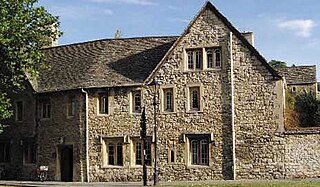
Holywell is a parish in Oxford, England. The toponym is derived from the well of Saint Winifred and Saint Margaret.

Oxford is a university city in south central England and the county town of Oxfordshire. With a population of approximately 155,000, it is the 52nd largest city in the United Kingdom, with one of the fastest growing populations in the UK, and it remains the most ethnically diverse area in Oxfordshire county. The city is 51 miles (82 km) from London, 61 miles (98 km) from Bristol, 59 miles (95 km) from Southampton, 57 miles (92 km) from Birmingham and 24 miles (39 km) from Reading.

Winchester College is an independent boarding school for boys in the British public school tradition, situated in Winchester, Hampshire. It has existed in its present location for over 600 years. It is the oldest of the original seven English public schools defined by the Clarendon Commission and regulated by the Public Schools Act 1868.
In 1583 appeared his A Short Treatise of the Sacraments, which he dedicated to Sir Francis Walsingham. He attacked the Catholic Rheims translation of the New Testament in his Fruitefull and Briefe Discourse...of Nature...[and] of Grace and acquired a reputation as a fiercely pro-Protestant preacher. He was also against Martin Marprelate. [1]
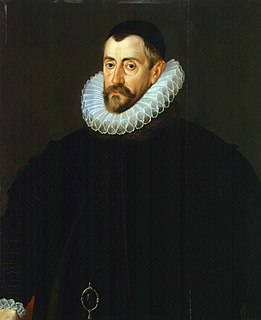
Sir Francis Walsingham was principal secretary to Queen Elizabeth I of England from 20 December 1573 until his death and is popularly remembered as her "spymaster".
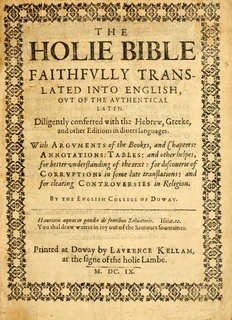
The Douay–Rheims Bible is a translation of the Bible from the Latin Vulgate into English made by members of the English College, Douai, in the service of the Catholic Church. The New Testament portion was published in Reims, France, in 1582, in one volume with extensive commentary and notes. The Old Testament portion was published in two volumes twenty-seven years later in 1609 and 1610 by the University of Douai. The first volume, covering Genesis through Job, was published in 1609; the second, covering Psalms to 2 Machabees plus the apocrypha of the Vulgate was published in 1610. Marginal notes took up the bulk of the volumes and had a strong polemical and patristic character. They offered insights on issues of translation, and on the Hebrew and Greek source texts of the Vulgate.

The New Testament is the second part of the Christian biblical canon, the first part being the Old Testament, based on the Hebrew Bible. The New Testament discusses the teachings and person of Jesus, as well as events in first-century Christianity. Christians regard both the Old and New Testaments together as sacred scripture. The New Testament has frequently accompanied the spread of Christianity around the world. It reflects and serves as a source for Christian theology and morality. Extended readings and phrases directly from the New Testament are incorporated into the various Christian liturgies. The New Testament has influenced religious, philosophical, and political movements in Christendom and left an indelible mark on literature, art, and music.

Edmund Grindal was an English Protestant leader who successively held the posts of Bishop of London, Archbishop of York and Archbishop of Canterbury during the reign of Elizabeth I of England. Although born far away from the centres of political and religious power, he had risen rapidly in the church during the reign of Edward VI, and was nominated Bishop of London, but the death of the King prevented him taking up the post and along with other marian exiles he fled to the continent during the reign of Mary I. On the accession of Elizabeth I he returned and resumed his rise in the church, culminating in his appointment to the highest office.
Laurence Tomson was an English politician, author, and translator. He acted as the personal secretary of Sir Francis Walsingham, the secretary of state to Elizabeth I of England.
This article presents lists of the literary events and publications in 1588.

The Marprelate Controversy was a war of pamphlets waged in England and Wales in 1588 and 1589, between a puritan writer who employed the pseudonym Martin Marprelate, and defenders of the Established Church.

Gervase Babington (1549/1550–1610) was an English churchman, serving as the Bishop of Llandaff (1591–1594), Bishop of Exeter (1594–1597) and Bishop of Worcester in 1597–1610. He was a member of the Babington family and held influential offices at the same time as his cousin Anthony Babington was executed for treason against Elizabeth I as part of the Babington Plot.
John Field (1545–1588), also called John Fielde, was a British Puritan clergyman and controversialist.
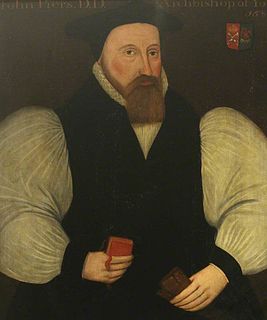
John Piers (Peirse) was Archbishop of York between 1589–1594. Previous to that he had been Bishop of Rochester and Bishop of Salisbury.

Sir Francis Knollys, KG of Rotherfield Greys, Oxfordshire was an English courtier in the service of Henry VIII, Edward VI and Elizabeth I, and was a Member of Parliament for a number of constituencies.

Robert Bolton was an English clergyman and academic, noted as a preacher.
Job Throckmorton (Throkmorton) (1545–1601) was an English religious pamphleteer and Member of Parliament. Possibly with John Penry and John Udall, he authored the Martin Marprelate anonymous anti-clerical satires; scholarly consensus now makes him the main author.
Robert Some (Soame) (1542–1609) was an English churchman and academic. Master of Peterhouse, Cambridge from 1589, Some played a prominent part in the ecclesiastical controversies of his time, taking a middle course, hostile alike to extreme Puritans and Anglicans.
Perceval Wiburn or Wyburn (Percival) (1533?-1606?) was an English clergyman, a Marian exile, suspected nonconformist and Puritan, and polemical opponent of Robert Parsons.
Edward Dering was an English priest and academic, known as a classical scholar, controversialist, supporter of Thomas Cartwright, and fiery preacher against his fellow clergy. Constantly in trouble from 1570, he was not found to be nonconformist in doctrine, but was an opponent of the episcopate.
John Stockwood was an English clergyman, preacher, translator of Protestant texts and school-master.

The reign of Elizabeth I of England, from 1558 to 1603, saw the rise of the Puritan movement in England, its clash with the authorities of the Church of England, and its temporarily effective suppression as a political movement in the 1590's by judicial means. This of course led to the further alienation of Anglicans and Puritans from one another in the 17th century during the reign of King James (1603-1625) and the reign of King Charles I (1625-1649), that eventually brought about the English Civil War (1642-1651), the brief rule of the Puritan Lord Protector of England Oliver Cromwell (1653-1658), the English Commonwealth (1649-1660), and as a result the political, religious, and civil liberty that is celebrated today in all English speaking countries.
John Garbrand or Herks (1542–1589) was an English cleric, a prebendary of Salisbury Cathedral and friend of Bishop Jewell.
Sir John Wolley was Queen Elizabeth I's Latin Secretary, a member of her Privy Council, and a member of Parliament from 1571 until his death in 1596.
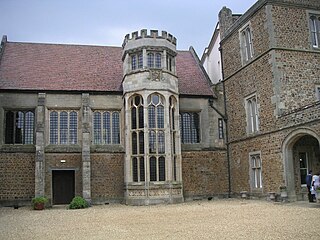
Robert Waldegrave or Walgrave, the son of Richard Waldegrave of Blockley, Worcestershire, was a 16th-century printer and publisher in England and Scotland. From 1578 to 1588 he printed numerous, mainly religious works in London, and from 1590 to 1603, more than 100 books in Scotland. In 1603, following King James I of England's accession to the English throne, he returned to England, but died later the same year.
Robert Harrison was an English lay schoolmaster who became a religious leader as a Protestant Separatist, one of the original Brownists.
Elizabeth Hussey, later Elizabeth Crane and Elizabeth Carleton, was a religious activist with strong Puritan sympathies. She and her second husband, George Carleton, were prosecuted for involvement in the Marprelate controversy. The first of the anonymous Marprelate tracts, Martin's Epistle, was printed at her home in East Molesey, Surrey, in October 1588.















